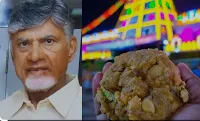The much-publicized Tirupati Laddoo controversy has caused a storm in India, with reactions from religious leaders, politicians, and millions of devotees. The world's most revered pilgrimage site, the Tirupati Balaji temple, finds itself at the center of a heated controversy brewing due to the alleged use of animal fat, including beef tallow and fish oil, in the preparation of the sacred laddu rendered as prasad. This development has indeed hurt the feelings of devotees of Hinduism, resulting in law suits, political fights, and collective outrage.
The Allegations: A Blow to Devotee Faith
Controversy erupted when the Chief Minister of Andhra Pradesh, Chandrababu Naidu, alleged that the previous government under the YSR Congress used animal fat to prepare the Tirupati laddoos, a famous dish. A laboratory in Gujarat apparently found that the ghee used in the laddoos contained beef tallow, fish oil, and possibly lard or pig fat. This reached the nation with almost everyone having an opinion about it. The laddoos were, for millions of devotees, something more than a sweet: they represented a sacred offering, in fact a very blessing of Lord Balaji himself. Alleged adulteration of such prasad has sparked emotive reactions all over the country.In his Supreme Court petition, lawyer Satyam Singh submitted an argument which stated the contamination of laddoos was a violation of Article 25 of the Indian Constitution, which is free to practice religion. The petition argued such actions denude the sanctity attached with Hindu religious practices and cry for the intervention of the courts to preserve sacred customs associated with Tirupati temple.
Political storms and Reactions
Besides ruffling religious feathers, the row also triggered a political storm. The ruling BJP and its ally, the Telugu Desam Party, accused the YSR Congress Party of mismanaging the temple and allowing religious customs to be violated. The next shock came when BJP leader Bandi Sanjay claimed that the laddoos were blessed to have animal fat in it, but people from other religions were being included in the board of temple administration. That has further polarized the debate and invoked communal undertones into the controversy.Meanwhile, Leader of Opposition in AP assembly and former Chief Minister of Andhra Pradesh Jagan Mohan Reddy has outrightly rejected the allegations, saying that they are a political gimmick to draw attention from other pressing issues. YSR Congress MP YV Subba Reddy, who had a term as TTD chairman, alleged that Naidu is trying to misappropriate the sanctity of the temple for his political lobbying and asked him to take an oath on the issue before Lord Balaji himself. However, the battle has turned out to be an intense political showdown with both camps using the controversy to consolidate their support bases.
Brand and Religious Leader Reactions
Even as the politicos indulge in a mud-slinging battle, brands with a pedigree attached to the temple have landed in the controversy too. Amul, the undisputed leader among Indian dairy brands, was compelled to clarify publicly when news went around that the brand had supplied the suspicious ghee to the temple. In a statement, Amul aptly clarified that it never did supply ghee to the Tirupati temple and termed the reports as "misinformation campaign". The company also clarified its stand and stated that it strictly uses pure milk for making ghee and complies with all FSSAI quality standards, thus pulling away from the controversy.Religious leaders have also joined the issue. I had protested this several years ago when I used to be a priest of Tirupati temple, according to Ramana Deekshitulu, the former chief priest at the Tirumala temple. Apparently, the quality of ghee supplied for laddu was of very poor quality. Nobody listened to me then. The use of animal fat in a temple as holy as Tirupati is nothing short of a "great sin" that deeply offends the faith of millions of devotees, according to Deekshitulu. He appealed to the authority to take lessons from such misdemeanors so that the repetition of such cases is not seen in future and strengthens the vigilance on temple management .
Popular Feeling: Faith Under Attack
Devotees are said to be devastated by news of alleged animal fat contamination of the Tirupati laddoos. For many, the very idea that prasad-the kind of divine blessing-seems unthinkable for having become tainted with animal products. Calls for retribution and speedy action against those accused flood social networking sites. Religious sentiment runs deep in India, and any activity deemed offensive to a holy place or practice often provokes sharp reactions.
Rahul Gandhi, the Indian National Congress leader, expressed his concern through social media and demanded that a thorough investigation be conducted on the issue. Gandhi said that religious space should be a place to be protected at all times in the same way that people face their millions of devotees faith scenario. His words resonated much as people continue to hold the TTD and the Andhra Pradesh government accountable.
TTD and Government Responses
The governing body of the Tirupati temple, Tirumala Tirupati Devasthanams (TTD), played down the controversy at first. However, when successive lab reports confirmed the presence of impurities in ghee supplied by a contractor, TTD sprang into action by suspending supplies from the alleged vendor and blacklisting the contractor. TTD Executive Officer J. Shyamala Rao assured the public that strong action was being taken to prevent such incidents in the future.The Union Health Minister, JP Nadda, demanded an elaborate report from the government of Andhra Pradesh. The Centre had to intervene in which Union Food Minister Pralhad Joshi demanded a thorough investigation into the allegations. The Centre's involvement has made this controversy hot.
















